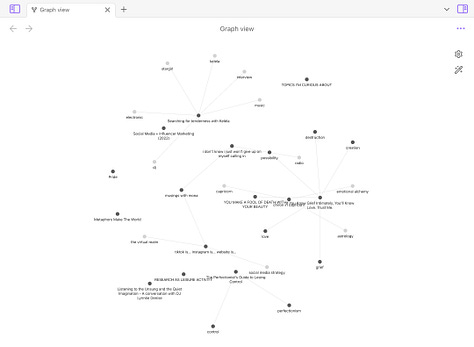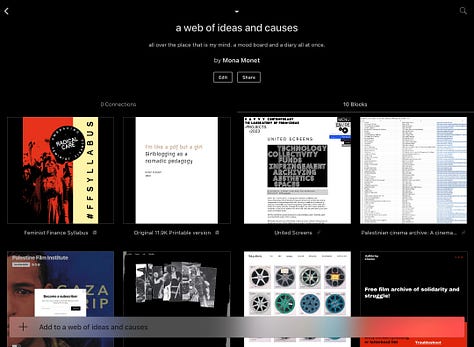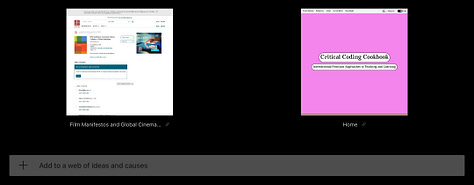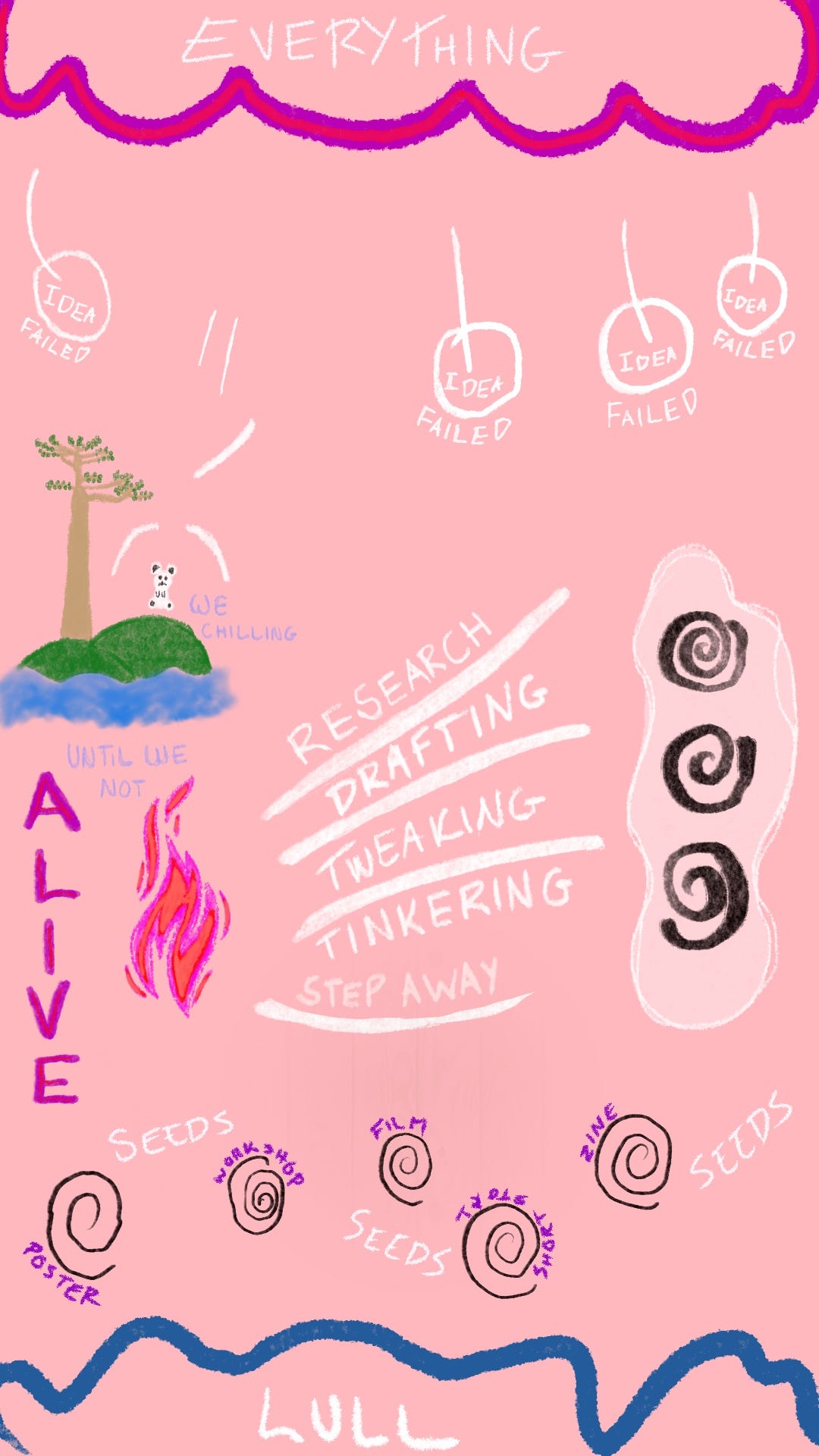a blank piece of paper chuckles as you stare it down, sweating. the blank canvas yawns as you sit frozen before it. that b roll you took of the city will never be re-opened again. what is your greatest fear as a creative?
blankness? the proverbial creative block?
two years into my journey as a creative and i believe boredom and i have a tolerable relationship. i am ok with not being as active with my pen, on the decks or with my camera. i have been experiencing that inactivy these past few months and it's recently that i can feel the light again.
i believe that the lull periods are a part of the creative process. there comes a point where the end of the lull and the beginning of activity meet, and it's up to you to decide when one is over and the other begins. you'll get hints, but you decide.
part of entering this lull period was burnout. i thought that being creative was always coming up with cool, new ideas or that it was being good at seeing other ideas and giving it a new spin. these are all fair ways to begin, but it isn't sustainable to rely on newness or on others. so, how do you cultivate a seemingly endless well of inspiration?
embrace research as a source of play and as a creative practice.
research has a reputation of only being valid within institutions - the academy, government or businesses. the rigor, commitment, time and effort needed to build knowledge serves a means to an end, and that's what we believe makes it valuable. yet the artists, writers, entrpreneurs, and content creators we admire all engage in research to create. it's part of why album rollouts used to be longer, why you can tell a good product or service over one that was made cheaply for profit and why no matter how dire the state of the journalism and media industry seems to be, we appreciate well researched and careful reporting.
it's a fundamental step in the creative process. if you search writing scripts, or albums or designing a website, research is often the second or third step. in some cases, novelists and painters talk about how research is the beginning of where ideas become books or pieces. we can tell and often value outputs that have research - context, facts, characters, stories - cradling it. embracing research as leisure activity could be a way for people who identify as creatives to sustain their sources of inspiration.
one thing about me is i love a bag. when i went to niamey in 2008, my aunties called me bag lady because i would always have one on me.
if i wanted to explore my love for bags, i could go about my research in two ways: traditionally or what i will call leisurely. both begin with an avenue of inquiry, usually a question.
something that determines if i fuck with a bag or not are the pockets. how does the design of a bag invite more or less pockets? do the lack or excess of pockets in a bag signify its luxurious nature? what differentiates trad research from leisure research is the way the question is posed. with the trad mode, you might even do preliminary research to narrow down the topic of pockets in bags to something specific like woven pockets in bags from pre-colombian peru. with trad research, you get specific to become an expert.
in leisure, you get specific because the research is interesting. it starts from asking what does pockets in a bag mean for the design and for its status. you can get specific, or you can broach multiple, overlapping ideas. it also encourages deviation - exploring topics outside of one's expertise.
in both modes, commitment to evidence and the truth is required to answer the research question. regularly measuring findings also brings the two together, either quatitatively (analysing and examining numerical data), qualitatively (interviews, second hand analysis, ethonography, media analysis, etc) or through mixed-media methods.
leisurely research is fun because looking into alternative, not-obvious tecniques and methods of getting information is fair game. that could be podcasts, video essays, subbreddits about hand bag history, but also conversations with grand-mère from across the street who still wears her worn bag from her youth, your own field research digging through a thrift store or the tumblr blog of a once 13 year-old obsessed with bottega leather.
both trad and leisure research are concerned with the impact of subjectivity in the process and within the results, and reflect on it throughout, at the beginning and at the end of the study. in trad research, that’s to stay accountable to those affected by the work and to maintain integrity as a researcher. part of the leisure of research is observing how your biases as a researcher colours your process, which could be an interesting layer for storytelling or product design purposes.
both necessitate contextualization: offering historical details, trends and patterns of the concerned disciplines. knowing the evolution of handbags throughout history gives more body to our understanding of pockectry (my word for the art of pocket design lol).
whether traditional or leisurely, the findings will lead to a shareable output that advances inquiry or new arguments. outputs in trad research will usually be essays, presentations and dissertations. with leisurely research the outputs are more free. it could be films, paintings, courses, short stories and more. for my bag research, i could design a thrift flip workshop where we sew pockets in abandoned bags and create our own bag charms to bring them new life.
both modes address current concerns while leaving room for movement beyond (understanding the future) or before (understanding the past) contemporary issues. finally, like most things, both types are strenghtend by community, whether that is peer to peer exchange, mentorship or group collaborations.
so, why should you embrace it as a creative practice within your process?
in our current world, we mindlessly blur art and content, and we are consuming way more ideas and (questionable) facts than we can possibly process. rapidity and urgency are squeaky, anxious voices pushing us to produce over actually create. it's overwhelming.
a slower and diligent act of building a personal, creative encyclopedia might be the practical response to this shared problem that i and other creatives indulgently whine about.
leisurely research, really, is self-motivated and guided so you can do research about... ANYTHING! it’s directed by passions and interests rather than having to be something consequential that will lead to policy or material change. it encourages leaning into our curiosity and our quirks earnestly, rather than pretending to needing to be experts or completely shutting off our minds to deeper understanding.
it makes this having access to hella information shit a little more light and fun. approaching research as play means applying as much or as little rigor as needed or wanted, so long as the basics of research are observed.
so, how does that help you as a creative?



essentially, building a network of ideas and references that is effectively (for your needs) organized is the key to replinishing your creative well.
instead of always needing to shit something new and out there (bc i swear that's how it feels like) or lose all your inspiration in an endless, unorganized instagram saved tab, keep a unified record of notes, quotes, summaries, images and media. then, as you encounter things, you add them to the record which will grow into a web of knowledge. you can then use this web as a jumping off point for a new piece, or you can collage and pastiche ideas, images and more to make a skeleton/outline. overtime, ideas will have links that can be as specific or as general as desired, and because you did the work before to organize shit, you can add details and texture to your creations.
humans are social animals, and connection starts from information and story exchange. and who doesn't love to gather information, build expertise and be like: "fun fact...!"? idk i fucking do.
i wanna bring back true nerd culture where being sincere in your interests is your biggest personality trait. more creatives should operate like geeks rather than influencers.
maybe i'm getting ahead of myself… we do live in an attention economy.
some people do need to be influencers because they are making content not art. but even content should be interesting. i want my ads and entertainment to have substance. if you're selling me shit or distracting me, let it be creative at least. research helps with that.
artists are nerds anyways and those adjacent to them are slightly less shameless about being one. so while research as leisure activity is unserious in what it is investigating (until it isn't), it is serious and devoted to the process of gathering information, connecting it and documenting it. and doing that over and over again.
try it and see.
this mini essay reflects on research as leisure activity from ‘personal canon’ by celine nguyen.
this article is the first of many mini essays. though they won't always be this long lol.
this concept is one i learned from odysseas on youtube, who has many videos about the effectiveness of minis essays as a tool for retaining information from what you consume, strengthening your writing and developing a sense of storytelling. he also has video about making obsidian into a second brain which is where i modelled mine from.
i am also inspired by alice sparkly kat, one of my favourite blogs on the internet. they write about astrology and anything they want.
with musings with mona v.2, i want to expand my writing and storytelling. mini essays are a new way to challenge myself to share my thoughts and understanding of topics that interest me beyond… myself :) it’s a new writing challenge for me. i never liked to talk about things i don't know about but in v.2 we’re breaking that rule. otherwise how will we learn? sometimes you gotta stop gathering information and learning before acting, and just have the confidence to do shit.
mini essays will help me pace my consumption, write consistently and have more fun with my writing. that is this season’s experiment. we’ll see.




